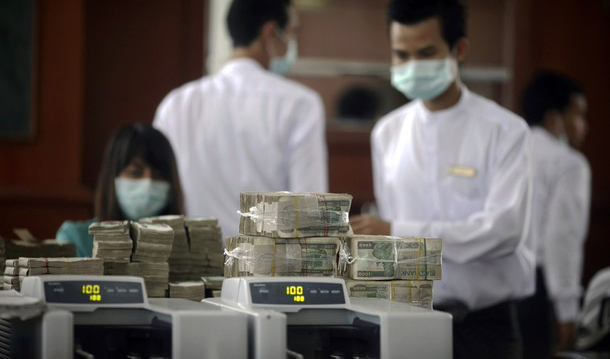There are also growing expectations that the exchange rate will be readjusted to better reflect the country’s economic needs.
Dumping an unrealistic and grossly inefficient system that has long distorted Burma’s economy is definitely a step in the right direction, but it is one that will require a degree of expertise that is completely lacking among the country’s key decision makers.
That’s why the government has turned to the International Monetary Fund (IMF) for advice. To provide this advice, the IMF will first of all ask Naypyidaw to provide key macroeconomic data, such as foreign exchange reserves, balance of payments, national budget, money supply, GDP (including its sectoral composition and growth rate), household income and expenditures surveys, foreign direct investment inflows and foreign trade statistics.
IMF spokeswoman Gita Bhatt recently confirmed that the Washington-based financial institution had received a request from the Burmese authorities to help them "prepare to modernize their exchange-rate system and lift restrictions on the making of payments and transfers for current international transactions." She said the IMF planned to send a technical team to Burma in late October to begin the process, but other details about contemplated reforms weren’t available.
The government seems convinced that it is on the right track. The "problem of exchange rate gap, the main barrier to international trade, will be solved along with the proper evolution of market economy," Finance Minister Hla Tun was as quoted saying in The New Light of Myanmar, which also reported that the authorities had reached out to the IMF and sent trainees overseas as part of its efforts to reform the exchange rate.
Beyond providing some much-needed advice, however, the IMF is unlikely to play a major role in bringing these plans to fruition. Because Burma hasn’t paid back its debts to multilateral financial institutions—and because the US wields effective veto power over the IMF—the country is barred from receiving any new financial aid.
That shouldn’t matter, however, because Burma is believed to have abundant foreign exchange reserves (thanks to its sales of gas, gems and other natural resources), which it would need if it decided to discard the fixed exchange rate completely and simply float the kyat.
While this might seem like a radical departure for a country that has spent nearly 50 years under a succession of authoritarian regimes notorious for maintaining a stranglehold over every major sector of the economy, floating the kyat could very well be the best way forward. Best of all, it "would require quite literally little more than the stroke of a pen," according to Macquarie University’s Sean Turnell.
In fact, introducing a floating currency would only be a matter of making official the informal system that has long been in place in Burma, where for decades most international transactions have been based on an unofficial exchange rate determined by market forces.
Floating the kyat would reduce bureaucracy, increase economic freedom and hinder those elements that use the current exchange-rate arrangements as a vehicle for corruption, said Turnell, who added that the dual exchange rate allows government officials and state-owned enterprises to in essence maintain two sets of books, enabling them to hide revenues that could be diverted to other needs.
The only danger, however, is that bringing a degree of common sense to Burma’s exchange rate system could create the false impression that the country’s economic problems can be solved without other, more fundamental changes.
"The exchange rate issue is important, but it’s far from the most serious of Burma’s economic problems, which have their roots in the lack of property rights, reasonable policy making, a voracious state apparatus, etc," said Turnell.
According to a 2008 paper by Dr. Tin Soe, a former professor and department head at the Rangoon Institute of Economics, Burma’s economy since the early 1960s, when the country first came under military control, has been characterized by "inconsistency, instability, interruption and discontinuation, rigidity and limited scope and vision, lack of transparency, unpredictability and uncertainty, quantitative physical targets-orientation, inefficient and ineffective implementation and use and abuse of consultancy and advisory services."
In other words, if Thein Sein really wants to make a difference, his government will have to break half a century of bad habits. Floating the kyat would be a start, but it will take much more than this to clean out the Augean stables of Burma’s economy.
This article appears in The Irrawaddy’s latest e-magazine. http://issuu.com/irrawaddy/docs/irr_vol.19no.3_sep2011_issuu/34?viewMode=magazine&mode=embed

